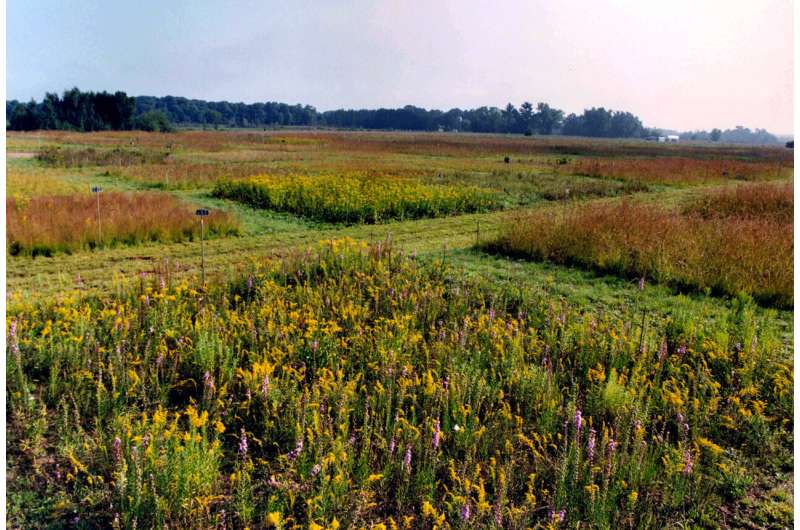Short-term plant-soil feedback experiments fall short in predicting competition outcome of long-term field experiment

The cause-effect sequence or “feedback” between plants and their soil microbial communities plays an important role in structuring plant communities. To predict this synergistic coexistence, researchers conduct short-term, pairwise experiments—measuring growth response of two plant species growing in soil cultivated by each of the species—based on mathematical theory. But does it work?
Utah State University ecologist Noelle Beckman and colleagues Ray Dybzinski of Loyola University Chicago and David Tilman of the University of Minnesota measured plant-soil feedbacks for six perennial prairie grass species in a short-term greenhouse study, and say their findings do not match outcomes observed in the long-term experiment conducted at Minnesota’s Cedar Creek Ecosystem Science Reserve. They reported their results in the Oct. 8, 2022 issue of Ecology.
“With the theoretical advancement of a pairwise feedback metric, there’s been a proliferation of short-term experiments,” says Beckman, assistant professor in USU’s Department of Biology and the USU Ecology Center. “However, few studies have linked the predictions of coexistence from species pairwise comparisons of plant growth from short-term experiments to the outcome of competitive interactions in the field.”
Plant-soil feedbacks, she says, are expected to shift with nutrient availability.
“The pairwise feedback metric is only valid, when the two species exhibit an internal equilibrium, but that condition is only true for two of the four possible outcomes of species interactions,” says Dybzinski, assistant professor in LUC’s Institute of Environmental Sustainability. “To make predictions using all four possible outcomes requires measuring plant biomass in uncultured soil, which is methodologically challenging and thus, seldom done.”
For their short-term experiments, the team measured plant-soil feedbacks in a greenhouse study under low and high nitrogen availability, with soil collected from field monocultures.
“Our study provides important insight into the use of short-term greenhouse experiments for predicting the outcome of pairwise competition under varying levels of nitrogen,” Beckman says. “Our results suggest we still have much to learn about these feedbacks and what we can specifically extrapolate from short-term experiments for long-term coexistence outcomes.”
Planting trees not always an effective way of binding carbon dioxide
Noelle G. Beckman et al, Short‐term plant–soil feedback experiment fails to predict outcome of competition observed in long‐term field experiment, Ecology (2022). DOI: 10.1002/ecy.3883
Citation:
Short-term plant-soil feedback experiments fall short in predicting competition outcome of long-term field experiment (2022, October 11)
retrieved 11 October 2022
from https://phys.org/news/2022-10-short-term-plant-soil-feedback-fall-short.html
This document is subject to copyright. Apart from any fair dealing for the purpose of private study or research, no
part may be reproduced without the written permission. The content is provided for information purposes only.
For all the latest Science News Click Here
For the latest news and updates, follow us on Google News.

